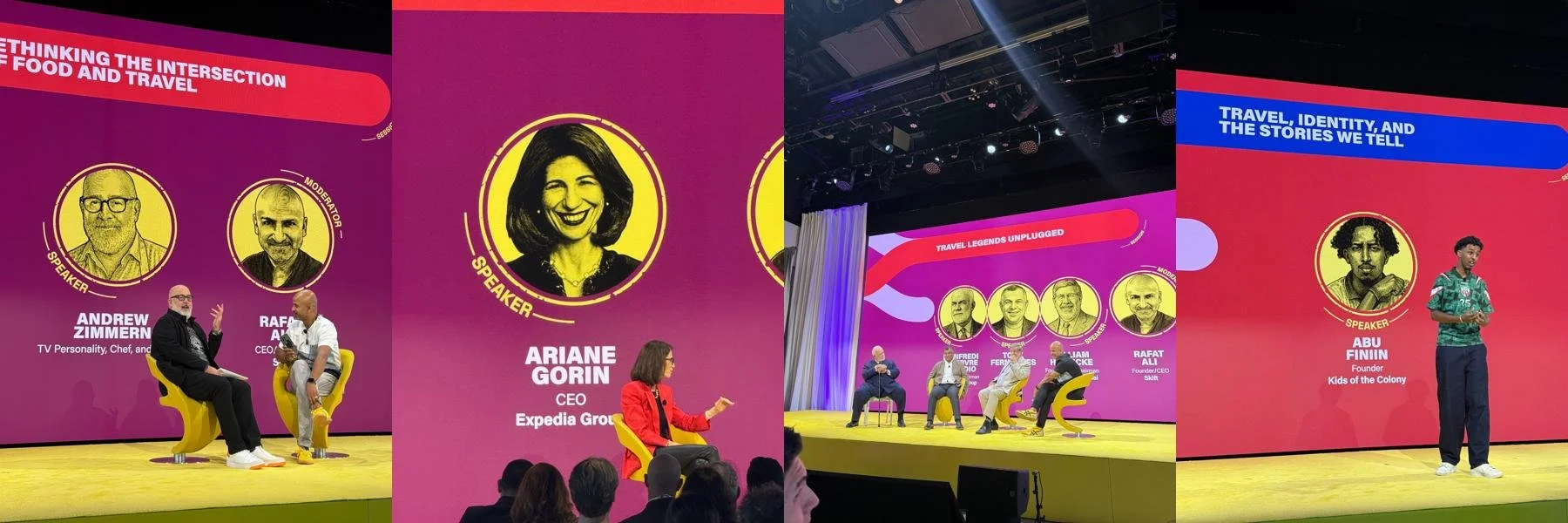Falling Back in Love with Travel at Skift Global Forum
What the travel industry’s top leaders revealed about the state of the industry, the future of agentic AI, and our journey to building a different kind of DMC at WhereNext Travel.
In January this year, I was falling out of love with the travel industry.
WhereNext Creative was two years into delivering USAID's largest-ever tourism development project, a 5-year, $40M tourism initiative in Colombia. One we poured heart and soul into. When the new administration issued its stop-work order, our prime contractor defaulted. Payments stopped. Guidance was messy. Keep staff employed. Stop work. Don’t invoice. Guidance ended.
As CEO, I had a choice: sink with the ship or take fast, uncomfortable, legally sound actions guided by my personal ethics. We laid off staff. We let go of independent contractors. It was brutal. Even worse, there was a real risk I could face criminal charges if I didn’t front the money to cover our prime contractor’s payment defaults.
But that moment forced clarity: What kind of company are we building? Who do we want to be in this industry? And are we really ready to bet on ourselves?
That’s why I showed up to the 2025 Skift Global Forum in New York City.
To ask a bigger question: Can we combine what we’ve learned from 15 years of tourism marketing for some of the world's most iconic travel brands and global development projects to build a business that controls both awareness and impact through travel?
These are the themes I came away with after three days at the Skift Global Forum, and what they mean for the future of travel, and for where we’re going next:
Agentic AI and the Connected Trip
Glenn Fogel, CEO of Booking Holdings & Booking.com, and Brian Chesky, Co-Founder & CEO of Airbnb, both spoke about eliminating friction. I paid attention. These guys are the leaders of the two biggest travel companies in the world by market cap. Their vision of the future is clear: one payment, one point of contact, and AI agents that handle every detail when plans shift.
“Travel is frustrating. The idea is to take the frustration out of travel.”
— Glenn Fogel, CEO, Booking Holdings & Booking.com
Bret Taylor, Co-Founder of Sierra and Chairman of the Board at OpenAI, described “agentic AI” technology that rebooks flights, updates drivers, shifts dinner reservations, and notifies guides without the traveler lifting a finger.
On multiple occasions, speakers referenced the human travel agents of the past as aspirational models for the next generation of AI agents: trusted, deeply personalized, and able to anticipate needs before the traveler even voiced them. They often used the term “the connected trip.”
“We are now living in a world where travel agents are AI.”
— Bret Taylor, Co-Founder of Sierra & Chairman of the Board, OpenAI
I like the term “the connected trip.” For WhereNext Travel, it has a double meaning. The connected trip is not just about systems that help with seamless logistics. It is about technology creating the conditions for a real human connection. To make guests feel something. That’s why we’re building an internal AI system that will be the invisible layer that ensures everything runs smoothly, so our teams can focus on delivering the moments that matter.
The Airbnb Threat (and Opportunity)
Brian Chesky’s Airbnb is doubling down on one app and one brand to deliver services. They’re investing heavily in video-driven marketing, and the big announcement was their expansion into boutique and independent hotels.
But what really caught my attention was Airbnb Originals, a new program to let travelers directly book “special people” like local guides and community leaders.
This is a direct challenge to traditional DMC revenue. Many DMCs market local talent as if they are employees, using terms like “ambassadors” or “team members,” when in reality they are independent contractors. Airbnb will enable B2C brands, travelers, and AI to bypass DMCs entirely and cut into what was once considered a competitive advantage.
My view is clear: If we claim and market someone as part of our brand, we need to employ them. Full stop.
In rural Colombia, for example, over 70 percent of employment is informal. That means no contracts, no benefits, and no protections. At WhereNext Travel, we do better. We hire legally, pay into the system, and treat our talent with the respect of formal employment. That is not just a moral stance. It is a strategic one.
It is only a matter of time before AI agents start bypassing the intermediaries. If you do not own the relationship with your team, a technology platform will.
Human-Centered Tech
Several leaders emphasized that AI should amplify, not replace, the human.
Bret Taylor reminded us that technology should free people to return to the craft of travel. There was also discussion of emerging AI technology that offers guests always-on, highly intelligent, and personalized guides. This kind of immersive interface also enables people to have the full experience virtually, without ever leaving home.
I believe the future of travel, especially in the luxury sector, lies in a thoughtful blend of smart AI and real human interaction. Travelers in this space are not just buying efficiency. They are investing in human connection.
“First and foremost, we are a human connection business.”
— James Thornton, CEO, Intrepid Travel
These discussions reminded me of a scene in Good Will Hunting, when therapist Sean Maguire (Robin Williams) tells the boy genius, Will Hunting (Matt Damon), “If I asked you about art, you’d probably give me the skinny on every art book ever written... but I bet you can’t tell me what it smells like in the Sistine Chapel. You’ve never actually stood there and looked up at that beautiful ceiling.”
That line captures the essence of what travel is meant to deliver. Not just information, but emotion. Not just answers, but awe.
Tech that replaces humans is the baseline. Tech that frees humans to elevate the guest experience will be the advantage.
“The power of connection has overwhelmed the power of convenience.”
— Eric Resnick, Co-Founder & CEO, KSL Capital Partners
Redefining Luxury
Alexandra Walterspiel, President & CEO of Sensei and Neil Jacobs, Founder of Wild Origins, both challenged the homogenization of luxury.
Too many brands are delivering the same checklist. Real luxury is being seen for who you are, without being put on display. It’s the nearly empty tube of toothpaste that was replaced before you asked. The pen that appears when you ask for paper.
Luxury is intimacy and anticipation. It’s values reflected back to the traveler, not ego. Our role is to make each guest feel understood, not categorized.
Purpose Behind the Fun
Purpose was another recurring theme throughout the SKIFT conversations. There seems to be a gap between what people say they want and what they actually spend their money on. As Barry L. Biffle, CEO of Frontier Airlines, put it, “Don’t look at what people say. Look at what people do. Follow their wallet.”
During another session, someone asked James Thornton, CEO of Intrepid Travel, “Do US consumers even care about sustainability?” It was a bold question, especially for a company that proudly leads with purpose. Thornton didn’t flinch. He answered, “You don’t book a trip through Intrepid because of sustainability. You do it because you want a great trip.”
That landed. It was a clear reminder that travel, first and foremost, should be joyful. Fun. Human. Behind the scenes, I agree with James that we must operate responsibly, pay people fairly, minimize environmental impact, and ensure benefits flow to communities. But for the guest, the experience comes first. That balance is what makes the impact last.
Across many conversations, I sensed that we, as an industry, may have focused so heavily on sustainability, transformation, and purpose-driven messaging that we’ve lost sight of what actually inspires people to explore the world in the first place.
Perhaps because I’ve spent the past three years immersed in a massive international development project, I’ve been worn down by sustainability consultants and experts telling me what should matter. Somewhere along the way, I confused that with what travelers actually spend money on.
I think the real opportunity lies in the blend. Purpose matters, but it should be baked into the operation, not sold as a headline. Growth will come from delivering unforgettable, joyful trips that are also rooted in genuine local impact.
Integrity in Hard Times
Jason Liberty, President and CEO of Royal Caribbean Group, shared how, during COVID, his company took on debt to loan money to partners so they could keep their teams afloat.
“Integrity is not tested in good times but in crises.”
— Jason Liberty, President and CEO, Royal Caribbean Group
His story stood in stark contrast to what I experienced during the USAID project, after the government announced the agency’s closure and shut down our program. Our prime contracting partner refused to give us guidance, leaving us stranded financially and legally responsible for their defaults, despite being a billion-dollar business that brands itself as champions of their small business partners and a company committed to shaping a better world.
That moment was a gut check. I chose to lead through the crisis with the values we say we stand for.
We were forced to make the painful decision to lay off 40 staff and contractors, but we did it with honesty, direct communication, and full transparency. We didn’t hide. We didn’t deflect. We faced the situation head-on.
I covered the $350,000 USD obligations the prime contractor left behind. I paid out of both my personal and company savings to make sure people were treated fairly.
I’m proud of that.
“Culture is what you do, not what you say.”
— Ariane Gorin, CEO, Expedia Group
Ariane’s words reminded me exactly what kind of partner I want WhereNext Travel to be, and the kind of people we want to work with in the future.
Travel Storytelling Has Shifted
Steve Case, Chairman & CEO of Revolution, and Steve Hafner, Co-Founder & CEO of Kayak, reinforced what I’ve been feeling for years.
Storytelling is changing at the speed of culture. Travelers don’t just want postcard images. They want belonging, intimacy, and vulnerability. They want stories told by people who live them. For younger audiences, especially, it’s about human connection over catalog perfection.
At WhereNext Travel, our content needs to grab attention, teach something, and entertain. It needs to come from people who are part of the story, not outsiders looking in.
“Little moments of human connection. That’s what travel is about. Not just catalog perfection.”
— Abubakar Finiin, Founder, Kids of the Colony
Focus and Discipline
Tony Fernandes, CEO of Capital A / AirAsia, William E. Heinecke, Founder & Chairman of Minor International, and Elie Maalouf, CEO of IHG Hotels & Resorts, all pointed to the same lesson:
Success comes from focus and discipline. Stay true to your core model, and get great at it.
“Consumers are moving faster than most companies can make decisions.”
— Bret Taylor, Co-Founder of Sierra and Chairman of the Board, OpenAI
Final Thoughts
The people at the Skift Global Forum reminded me why I fell in love with this industry in the first place. The world is full of mundane itineraries. We’re building a DMC that doesn’t just sell trips.
We design travel that we would want: laughing until our stomachs ache, sharing time with friends old and new, finding quiet in wild places, and taking on new challenges.
Our art unfolds like a story, opens doors to hidden worlds, and connects guests to people and places that cannot be found anywhere else.
We use AI to free our team to focus on what matters most: creating human connections through travel.
#FeelSomething


